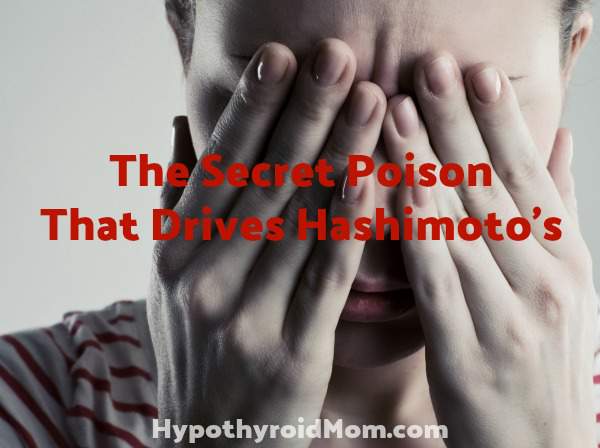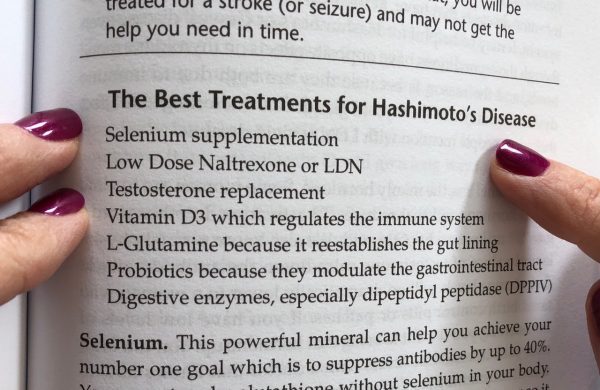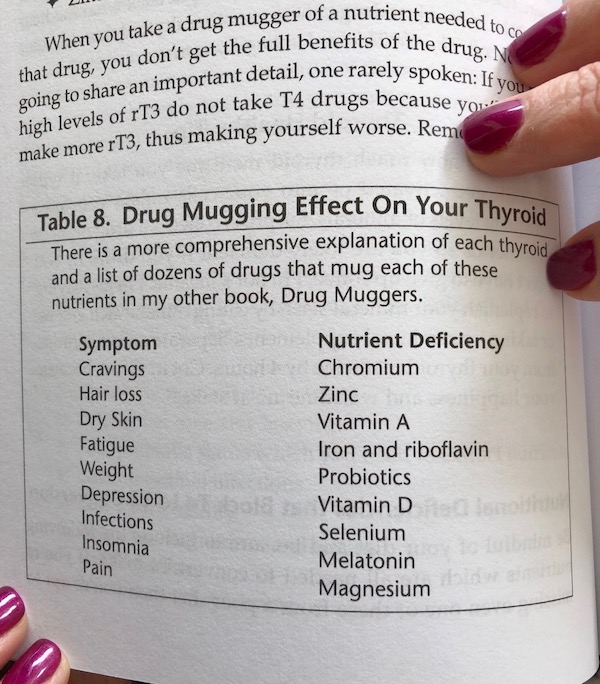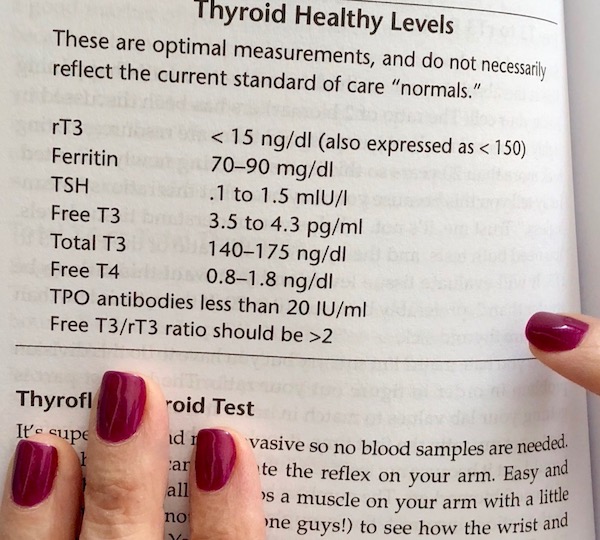
Hashimoto’s. It’s the number one cause of hypothyroidism, yet few of my Hypothyroid Mom readers have heard of it. Hashimoto’s. It’s more than a thyroid condition. It’s an autoimmune condition, yet thyroid medication is often the only treatment offered. Hashimoto’s. It’s a sadly common health condition that can come with all sorts of symptoms that doctors may mistakenly attribute to mental health issues. Hashimoto’s. It’s not all in your head. If you aren’t feeling well, it’s because thyroid hormone replacement medication doesn’t address the autoimmune component. Hashimoto’s. It’s possible to determine the root cause. It’s possible to reduce thyroid antibodies. It’s possible to feel well.
Written by Suzy Cohen, RPh
Imagine looking into the mirror, but instead of seeing your sweet self, you see a creepy robber and then start punching yourself, and it hurts. That’s autoimmune disease — your immune system perceives its own tissue as an invader, then seeks to destroy it, little by little. With Hashimoto’s, the thyroid is affected. With rheumatoid arthritis, it’s the joints. With MS, it’s the brain and spinal cord nerves and so on.
We all have some degree of autoimmune disease
It’s a scary thought isn’t it that you could have autoimmune dysfunction even though you may not have been diagnosed with a disorder yet. If you take my article to your physician today, they’ll tell you autoimmune disease is “rare” and here I’m saying I think all of us have some degree. I’m not crazy. We all have some degree of autoimmune disease whether or not we know it and I say that becuase we are constantly inhaling, eating or exposed to something that is NON-SELF. We may have pathogens inside us, we may have been exposed to some type of mold or yeast, or environmental pollutant or pesticide. We ingest probiotics from cow species and our babies drink milk from soybeans sometimes (both non-human, non-self). Do you see my point yet?
We sometimes have compromise to our immune system or allergies to dust, pets or dander, spices, medications or flowers, seeds, fruits and on and on. The list goes on, all these things are NON-SELF. If our immune system does what it’s supposed to do, it sees things that are NON-SELF and it tags it with a special immunoglobulin. My point is not to convince you of this, but instead to show you that we are all encountering things that are non human, things that could easily trigger autoimmunity and we don’t even know it. It’s only “rare” because our old-school tests can’t detect it until 90 percent of the tissue or organ is completely destroyed. That’s how stupid our health care system is. Lab testing for many autoimmune disorders are so backwards that until the symptoms are out of control and you’re in terrible pain or finally starting to become disfigured (like knuckles in Rheumatoid for example), the tests don’t come back positive. Most of your tissue has to be destroyed or the autoimmune diagnosis is not given.
Take Hashimoto’s thyroiditis or Graves’ disease for example. These are both autoimmune diseases where your T cells (immune system) destroy your own thyroid gland. Symptoms swing in both directions of hypothyroidism and hyperthyroidism whether or not you have Graves’ or Hashi’s. At times you could have symptoms of both:
High levels of thyroid: You are nervous, hyperactive, anxious, you may have a rapid pulse, heart beat irregularities, diarrhea, feeling waves of warmth, you may sweat and have other symptoms where things feel speeded up. Remember, thyroid is a gas pedal in the body, it makes everything go (excessive amounts will cause diarrhea).
Low levels of thyroid: There are dozens of symptoms, basically everything is slow, you may have slowed thinking, slurred speech, brain fog, trouble word finding, chronic fatigue, weight gain, constipation (slow transit time in the gut), you may feel cold, metabolism slows so you put on weight (or you can’t get it off).
What’s the cure? But people don’t get cured when they take the “standard of practice” medications such as thyroid hormone drugs, or even after they undergo painful surgery and radiation treatments. This should cure you right? Wrong. Months to years later you go on to develop another autoimmune disease that targets another organ. When you have one autoimmune disease, you almost always have two or three or four. Most people have “multiple tissue antibodies” but they wouldn’t know it. So why aren’t people cured and why don’t they feel better when their TSH and other thyroid labs look good… and they go through all the gold standard treatments? The answer is almost common sense if you think about it. Let’s stick with thyroid illness, even though you can apply this to any other condition like psoriasis, MS, Lupus or Rheumatoid, etc.
Hashimoto’s disease
For my example on thyroid autoimmunity, it’s because NONE of the thyroid replacement meds block the assault caused by your T cells. They just replace absent thyroid hormone. The T cells (your immune system) are still going full force and trying to kill tissues in your body. If you had a thyroidectomy, they go and try to kill other tissues in your body. You’re still hosting a bad party. You gotta get the thugs OUT!
There’s a full-body cytokine storm of pro-inflammatory compounds and free radicals that are contributing to symptoms (even though your hormone levels are okay). Hashimoto’s will cause your immune system to eat away at your thyroid gland until it’s basically dead. That’s the shocking truth that physicians don’t usually tell you, they just hand you a prescription for thyroid hormone replacement medication and take the “wait and see” attitude.
While they’re waiting and seeing, and testing your TPO antibodies periodically, your thyroid hormone levels will swing high, then low, causing you to get misdiagnosed with a variety of emotional disorders such as anxiety, depression, bipolar, insomnia or panic attacks. When thyroid hormone is low, you will be fatigued, sad and cold. When thyroid hormone swings high you will feel anxious, irritable or experience rapid heartbeat and panic attacks. You might even get simultaneously diagnosed with Graves’ disease. Most often the thyroid antibodies for Hashimoto’s – Thyroid Peroxidase Antibodies and Thyroglobulin Antibodies – are not tested and the person has no idea they have Hashimoto’s and they are suffering. Even when the correct diagnosis of Hashimoto’s is made, there are treatment failures galore with thyroid medication.
Conventional doctors will say there’s no cure for Hashimoto’s or any autoimmune disorder and the best you should hope for is to put it into remission. I disagree.
Put out the autoimmune fire
Many of you still continue to have symptoms despite thyroid hormone replacement medication. It’s because there is more to Hashimoto’s and that’s the autoimmune fire burning inside you.
I want you to realize that the number one way to help Hashi sufferers is to avoid food antigens as best you can. Something upsets your thyroid gland, and causes the antibodies to rise. You have to determine what that “something” is. For most, it is dairy or gluten but can also be soy and lots of other grains. Here’s why you have multiple diseases going on: gluten is a hole puncher. You get gluten when you eat traditional bread, pasta and pastries, most notably from foods cooked with wheat, barley and rye. It’s everywhere. It’s an additive. Gluten pokes holes in your gut, whether or not you have Celiac disease, no one is special or immune. Gluten (as well as dairy) makes your “tight junctions” in your gut come loose, so other undigested proteins leak out of the gut, and into your blood stream. The proteins aren’t supposed to be in your bloodstream, they’re supposed to stay in your tube (your gut). But now, because gluten is a hole puncher, these proteins are all over your body and they’ve lodged in many different organs. This is just one mechanism, and I’ve simplified it tremendously.
Your immune system has the job of tagging these foreign proteins which are kind of innocent, they only leaked out because your gut is leaky. By the way, if your gut is leaky, so is your brain. These proteins are in organs and your immune system is poised to destroy the tissue wherever they lodge. You can see from this image from my Thyroid Healthy book that there are many additional useful treatments to help with Hashimoto’s, such as selenium, Low Dose Naltrexone (requires prescription), vitamin D, glutamine, probiotics, and digestive enzymes. Just a warning about glutamine, too much of that will cause excitotoxicity as it may begin to convert to glutamate so even though it’s great for the gut lining, be careful with it, especially if you are prone to anxiety.

Vitamin D is important for immunity, everyone knows that. But you may not realize that a deficiency from taking a statin or from poor sun exposure can increase your odds of Seasonal Affective Disorder (or depression), as well as flare ups in Hashimoto’s. There are “Drug Muggers” of nutrients and the deficiencies of these nutrients will cause more symptoms of hypothyroidism.

Hydrogen peroxide is like gasoline on the fire
Hydrogen peroxide is all over your body. Your cells produce hydrogen peroxide naturally every single second as part of cellular metabolism. Your body is supposed to turn that hydrogen peroxide into water and oxygen, but with Hashimoto’s, that process could be hindered, and then the peroxide builds up.
This build up of hydrogen peroxide may increase the level of TPO antibodies (Thyroid Peroxidase Antibodies) in your bloodstream. Without enough rust removers like Catalase and Glutathione, the hydrogen peroxide builds up like poison, and it causes your hair and skin to lose vibrancy and youthfulness. It causes peroxidation of your lipids, meaning you get dangerous cholesterol levels and broken cell membranes.
Hashi sufferers often have an enormous amount of “lipid peroxidation” which is a scientific term describing the destruction (or peroxidation) of fatty cell membranes. The hydrogen peroxide that your cells make are like acid to your cell membranes.
Catalase directly breaks down hydrogen peroxide, rendering it harmless, turning it into water and oxygen so it can no longer destroy your cell membranes and mitochondria. We all make the enzyme Catalase in our liver, but our bodies may fail to produce sufficient amounts of the enzyme Catalase to break down the build up of hydrogen peroxide. Bringing down excessive hydrogen peroxide is a key to getting well with Hashimoto’s, yet it receives very little attention.
The enzyme catalase is not the only way to clear the hydrogen peroxide buildup associated with Hashi’s. There was an interesting article published May 2017 in THYROID, The Official Journal of the American Thyroid Association.[1] Researchers evaluated participants with Hashimoto’s. They looked at various biomarkers especially iron (in menstruating women), selenium, and vitamin D status. They found that selenium is essential to thyroid action. And the reason was that the selenium helped form glutathione which … and I’ll quote them, “protect the thyroid by removing excessive hydrogen peroxide.” Their study suggested that some selenium would be helpful, especially in iodine-deficient areas. The researchers recommended about 50-100 mcg per day. They also recommended that clinicians check patients’ iron (particularly in menstruating women) and Vitamin D status to correct any deficiencies.
So now what?
Identify and remove food sensitivities. Gluten and dairy are the big ones for Hashimoto’s but triggering foods may also include sugar, alcohol, soy, caffeine, eggs, corn, gluten-free grains (including buckwheat, millet, quinoa, and amaranth), nightshades (including peppers, tomatoes, potatoes, eggplant), beans, and nuts. You can try to eliminate certain major foods known to cause sensitivities for a set number of days (say 30 days) then reintroduce one at a time to see your body’s reaction or test for food sensitivities.
Love your Liver. You naturally make catalase in your liver (and that’s the #1 enzyme that clears hydrogen peroxide) so liver health is important. Minimize liver-damaging substances where possible. As an example, alcohol can harm the liver, so reduce alcohol consumption. Milk Thistle is a natural herb that can revitalize the liver. A note of caution, if you are allergic to ragweed, chrysanthemums, marigolds or daises, you may be sensitive to milk thistle too. I created HashiScript with the enzyme catalase to clear the hydrogen peroxide buildup associated with Hashimoto’s. Our bodies are all different and we may have sensitivities to supplements too so speak to your doctor always about new supplements and start new supplements one at a time to watch yourself for adverse reactions.
Protect yourself from Acetaminophen liver damage. Acetaminophen (including Tylenol) is one of the leading pain relievers in the world. It’s probably in every medicine cabinet (including mine). Chronic use of acetaminophen, even in regular dosages, taken over a few days, or a few weeks can cause liver damage for some very sensitive individuals, and it’s hard to know in advance who you are. The mere ritual of drinking wine with dinner and then taking acetaminophen-containing pain relievers will silently strain your liver to the point of injury. Many years ago, probably in 2001, I warned my readers to take a certain supplement called N-Acetyl Cysteine (NAC) if you needed to take acetaminophen routinely, in order to protect your liver and restore glutathione levels. Glutathione is an antioxidant that has anti-cancer activity. I was right about NAC, and today, years later, conventional physicians are starting to recommend NAC too.
Reduce your toxic exposure. Consider buying organic fruits and vegetables to voice herbicides and pesticides. Be careful to select fish with the lowest possible mercury content. Avoid processed and canned foods. Use safe cookware and bakeware free of aluminum. Filter your drinking water from chlorine, fluoride and other harmful chemicals. Use fluoride-free toothpaste. Remove toxins from the air with a high quality air filter. Use toxin-free beauty products, cleaning supplies and personal care products.
Find daily ways to gently detox including infrared sauna sessions, skin brushing, hot yoga, regular exercise, and massage.
Include Selenium. Selenium protects the thyroid by removing excessive hydrogen peroxide. Selenium is found mainly in high-protein foods such as meat, fish, shellfish, eggs, and Brazil nuts. The content of selenium in foods is dependent on the soil concentration of selenium which is very low in some areas. Studies have shown that oral administration of selenium decreases serum TPOAb (Thyroid Peroxidase Antibodies) and TgAb (Thyroglobulin Antibodies) and postpones the development of hypothyroidism.[2,3,4] Selenium is essential for proper synthesis, activation and metabolism of thyroid hormones. Selenium taken preventively should be taken at 100 mcg once daily. If your levels are low, however, I recommend shooting for 200 mcg total daily. Read the labels of your supplements including multivitamin for selenium to ensure you don’t exceed the daily dose of 800mcg/daily as this level can be toxic.
Ensure your doctor checks your iron (particularly in menstruating women) and Vitamin D status. Studies show that low vitamin D status is associated with Hashimoto’s and that Vitamin D supplementation reduces thyroid peroxidase antibody levels.[5,6] Iron and Vitamin D should be tested regularly to determine the ideal dose of supplementation because excessive supplementation of iron and Vitamin D can be toxic.
Get a second or third opinion because each physician has a different toolbox for treating Hashimoto’s.
Get your thyroid tested properly. I recommend thyroid lab testing include Free T4, Free T3, Reverse T3, Thyroid Peroxidase Antibodies (TPOAb), and Thyroglobulin Antibodies (TgAb).
Get a copy of your own test results. Check that your results are optimal using this chart from my Thyroid Healthy book. If your doctor says, “Your thyroid is normal.” Don’t settle for that. Get a copy and make sure all the right tests have been run and that your levels are “optimal” not just “normal”. There is a big difference.

Ask for a trial course of thyroid medication even if your thyroid lab test results appear normal or high. Remember, as your antibodies are killing off the thyroid gland over time, your body dumps some of the thyroid hormone into your serum, so this means your labs will cause you to show higher T4 or T3 on the test. Your thyroid hormone levels will swing high, then low, and back again which may result in misdiagnosis based on thyroid lab test results. If your doctor immediately attributes your symptoms to emotional disorders such as anxiety, depression, bipolar, insomnia or panic attacks, seek a second or their medical opinion to find a physician well versed in the treatment of Hashimoto’s.
Uncover chronic infections. Infections are often an overlooked trigger for Hashimoto’s. Common infections associated with Hashimoto’s to check include H. pylori, Yersinia enterocolitica, Epstein-Barr Virus, Hepatitis C Virus, and Borrelia Burgdorferi (the bacteria that causes Lyme disease).
About Suzy Cohen, RPh
Registered pharmacist Suzy Cohen has been a health writer for over 15 years. Her syndicated column, Dear Pharmacist, reaches millions of readers each week and you may have also seen her blogs on The Huffington Post. She has spoken on programs such as Good Morning America Health, The Dr. Oz Show, The 700 Club, The View and The Doctors. Suzy developed a thyroid supplement line including a product called HashiScript formulated specifically for Hashimoto’s disease.
References:
- Hu, S. and Rayman, M.P. Multiple Nutritional Factors and the Risk of Hashimoto’s Thyroiditis. Thyroid. 2017 May;27(5):597-610.
- Turker, O. et al. Selenium treatment in autoimmune thyroiditis: 9-month follow-up with variable doses. J Endocrinol. 2006 July 1;190:151-156.
- Pekar, J. et al. Effect of selenium supplementation in thyroid gland diseases. J Elem. 2017. 22(1):91-103.
- Mazokopakis, E.E., et al. Effects of 12 months treatment with L-selenomethionine on serum anti-TPO Levels in Patients with Hashimoto’s thyroiditis. Thyroid 2007 Jul;17(7):609-12.
- Kim, D. Low vitamin D status is associated with hypothyroid Hashimoto’s thyroiditis. Hormones (Athens). 2016 Jul;15(3):385-393.
- Chaudhary, S. et al. Vitamin D supplementation reduces thyroid peroxidase antibody levels in patients with autoimmune thyroid disease: An open-labeled randomized controlled trial. Indian J Endronine Metab. 2016 May-Jun;20(3):391-8.
Original article and pictures take hypothyroidmom.com site
Комментариев нет:
Отправить комментарий